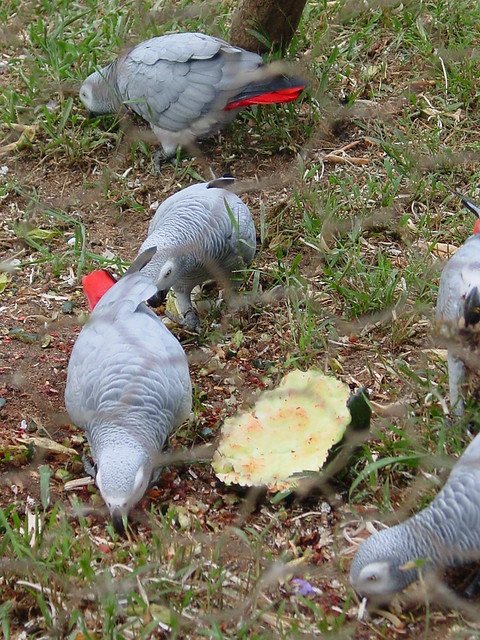 Seized Grey Parrots. Image by LauraA court in Yokadouma, East Region of Cameroon has handed out fines and damages amounting to FCFA 77,169,060 (US $ 160,000) and prison terms as high as 30 months severally on 17 poachers. The ruling unprecedented in the history of poaching cases in the Southeast of Cameroon, especially as it comes barely months after the same court sentenced four traffickers of 44 ivory tusks to a mild 30-day jail term.
Seized Grey Parrots. Image by LauraA court in Yokadouma, East Region of Cameroon has handed out fines and damages amounting to FCFA 77,169,060 (US $ 160,000) and prison terms as high as 30 months severally on 17 poachers. The ruling unprecedented in the history of poaching cases in the Southeast of Cameroon, especially as it comes barely months after the same court sentenced four traffickers of 44 ivory tusks to a mild 30-day jail term.
According to the verdict, four of the poachers who were caught with 14 ivory tusks near Boumba-Bek and Nki National Parks on March 24, 2012, were each given 18 months jail terms and fined FCFA 3 million. They were ordered to pay damages of FCFA 30 million.
Meanwhile, two recidivist parrot poachers Roger Atangana and lazare Onana, believed to be responsible for the decapitation of thousands of African Grey Parrots in Lobéké National Park were given a 2 and half years (30 months) jail sentence.
Atangana and three of his accomplices were ordered to pay a fine of FCFA 4 million and damages of FCFA 8 million failing which they will face an additional 2 years in jail. Atangana’s motorbikes were also confiscated and ordered to be put on auction sale.
These sentences amongst others handed down in Yokadouma, East Region of Cameroon, were the outcome of concerted judicial efforts made by WWF, Cameroon Ministry of Forestry and Wildlife, MINFOF and the Last Great Apes Organization, LAGA.
Prosecution lawyers provided by WWF and LAGA had urged the court during hearings to apply the law to the letter so as to deter potential wildlife criminals from pursuing their activities.
Unprecedented
These court rulings marked a watershed in the history of law enforcement against poaching in Southeast Cameroon, says, David Hoyle, Conservation Director for WWF Cameroon. “We congratulate the Cameroon judiciary for applying the letter of law and hope the decision will serve as deterrence to stop the wanton carnage of Cameroon’s wildlife,” Hoyle told journalists.
“This verdict will certainly boost the morale of forest rangers who have been hitherto saddened and disappointed by the series of mild court sentences passed by the courts over the years,“ Hoyle stated.
Balla Ottou, chief of sector in charge of wildlife, who was amongst the four representatives of Cameroon’s Wildlife Ministry at the trials said things were never going to be the same again. “We need such decisions to stop the hemorrhage,” Balla said.
The court rulings came on the heels of complaints by conservation organisations such as WWF and LAGA that Cameroon’s judiciary had been too lenient in handing down sentences on poachers, especially ivory traffickers. The sentencing of four ivory traffickers to one month jail term in January 2012 marked the height of disappointment.
The Southeast of Cameroon is home to iconic wildlife species such as gorillas, forest elephants and chimpanzees and thousands of African grey parrots, but these species, especially elephants are critically endangered due to poaching.
According to anti-poaching data provided by conservation services in Southeast Cameroon, at least 50 elephants are poached for ivory each year in the region. “Arrests are made on a regular basis but suspects have been systematically let off the hook,” noted Zacharie Nzooh, WWF Project Manager for Lobéké.
The anti-poaching operation comes just weeks after the Cameroon military sent in troops to the North Region of the country where poachers have slaughtered hundreds of elephants since January. Up to 12,000 elephants are killed each year for their ivory, most in Central Africa.
WWF provides leverage to Cameroon’s Ministry of Forestry and Wildlife as the country seeks to fight the upsurge in poaching. Logistics, financial and technical helped has been provided and collaboration established with partner organisations to help stem illegal exploitation of natural resources.